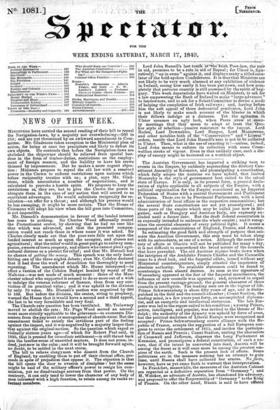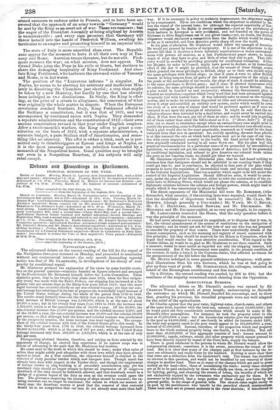The Austrian Government has imparted a striking turn to events
in the Empire, by suddenly superseding the dilatory Con- stituent Assembly at Kremsier, and promulgating a constitution, which fully adopts the doctrine we have upheld, that limited Monarchy is the style of government best suited to the actual state of Europe. It is only, in its present form a general decla- ration of rights applicable to all subjects of the Empire, with a political organization for the Empire considered as an Imperial Federation of States with a central Government and Parliament at Vienna. There are to be Provincial Parliaments, with a local administration of local affairs in the respective communities; but the several State constitutions are not yet promulgated ; and those parts of the empire which may be called just now in liti- gation, such as Hungary and Austrian Italy, are expressly ex- cluded until a future date. But the draft federal constitution is as expressly intended to embrace the whole empire ; and it recog- nizes the essential elements of every political right. It seems at compound of the constitutions of England, France, and America.
In estimating the good faith and strength of purpose that ani- mate the Austrian Government-, this step must be taken along with its antecedents, as one of a series. Although the secret his- tory of affairs at Ohniitz will not be published for many a day, it is not difficult to comprehend the broad nature of the counsels that have prevailed. The old Austrian regime broke down when, the intrigues of the Archduke Francis Charles and the Camarilla came to a dead lock, and the Imperial edicts, issued without any Ministerial countersignature, simply attested the impotence of absolute authority. No available statesmen could be found to countersign those absurd decrees. As soon as the signature of Wessenberg appeared at the foot of the Imperial manifestoes, the influence of new councils was apparent ; and, reviewed in sequel' from the present vantage-ground, the general character of those councils is intelligible. The leading men are in the vigour of life. Prince Schwarzenberg is about fifty years of age, and is distin- guished in the field and the council-chamber ; Count Stadion, the leading mind, is a few years past forty, an accomplished diploma- tist, and an energetic and intellectual statesman. The late Em- petor was led to the repose suited to his condition ; a young Prince, active, intelligent, and popular, was invited to the throne of Ro- dolph ; the authority of the dynasty was upheld by force of arms, but the political doctrines of Liberal Europe were recognized and accepted : Prince Schwartzenberg courts alliance with the Re- public of France, accepts the suggestion of a full European con- gress to revise the settlement of 1815, and invites the participa- tion of Russia and Prussia ; Count Stadion, uniting the characters of Cromwell and Jefferson, disperses the Long Parliament at Kremsier, and promulgates a federal constitution, of such a na- ture, that if the intent be converted into deed, Austria will be among the freest as it will once more be among the greatest em- pires of the earth. Such is the present look of affairs. Some politicians see in the measure nothing; but an attempt to gain time, until Russia shall have collected her armies. No facts, however, have as yet come forth to warrant that interpretation.
In Frankfort, meanwhile, the measures of the Austrian Cabinet are regarded as a definitive separation from " Germany "; and M. Welcker, an advocate of Austria, has abandoned his advocacy, and 'proposed to offer the Emperorship of" Germany" to the King of Prussia. On the other hand, Russia is said to have offered.
armed succours to enforce order in Prussia, and to have been an- swered that the approach of an army towards " Germany " would be met by the King as au overt aot of war. nue are rumours ; but the anger of the Frankfort Assembly at being slighted by Austria is unmistakeable ; and every sigiu 'atomises that Germany will throw herself into tke hands of Feederick Without, swelling his territories to an empire and promoting himself to an imperial title.



























